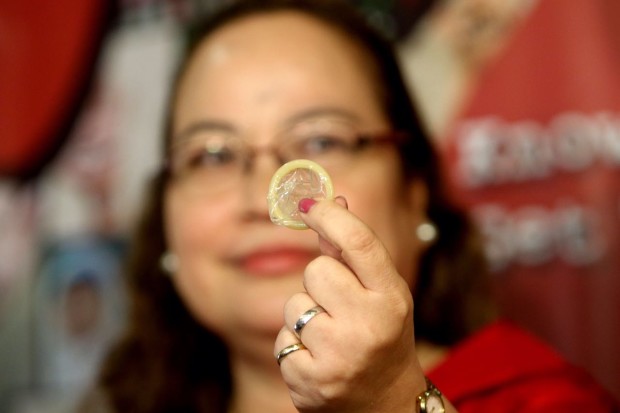DOH to start giving out condoms in schools next year

Health Secretary Paulyn Ubial encourages the use of condom to stop the spread of HIV during press briefing in Paranaque City. PDI Photo / Richard A. Reyes
Starting next year, the Department of Health (DOH) plans to distribute condoms in schools as part of its “business unusual” strategy amid the sharp rise in the number of HIV and AIDS among the youth in the country.
The DOH also urges parents to teach safe sex at home as part of the strategy.
“As soon as we thresh out the strategy with the Department of Education (DepEd), we can distribute (condoms) after providing them proper counseling,” Health Secretary Paulyn Ubial said in a press conference for the World AIDS Day 2016 on Thursday.
“Of course, we also have to prepare the school authorities, teachers, principals, healthcare providers,” Ubial said.
Data show that from 1984 to October 2016, a total of 38,114 HIV cases were recorded, with 32,099 tallied from 2011 to 2016. Among 15 to 24 years olds, there were 10,279 HIV cases during the period, of which 9,066 were tallied since 2011.
Alarmed by the rising HIV/AIDS cases, the head of the Episcopal Commission on Health Care of the Catholic bishops conference urged the youth to do their part in educating the public on the occasion of the World AIDS Day.
“The cases rose, especially for those aged 15 to 24 years old. They are [our] future, our high school and college students,” said Fr. Dan Cancino, the commission’s executive secretary.
On Radio Veritas, he invited the youth to join on Dec. 4 the National Catholic AIDS Sunday, which is celebrated every first Sunday of December to raise public awareness on HIV/AIDS.
“This is a day for us to increase our knowledge and awareness, especially the youth, on the global problem of HIV/AIDS,” Cancino said.
An awareness conference will be held on Sunday at the Chapel of the Eucharistic Lord on the fifth floor of SM Megamall in Mandaluyong City.
Be honest, factual
Ubial said the information campaign must go down to the household and community level.
“As soon as the child asks you a question, be honest, say it outright. (Don’t) talk about the bees and the birds,” she said.
“You talk to the child as if you’re discussing any topic under the sun. Be factual. Don’t beat around the bush. Don’t even use analogy. Just go straight to the point. I think that has been proven in other many countries that that’s the way to inform the youth,” she added.
World Health Organization (WHO) representative Gundo Weiler said educating the youth would enable them to protect themselves better.
Right information
National Youth Commission Chair Aiza Seguerra said parents must not avoid talking about sex to equip their children with the right information.
“Because of our culture, we get embarrassed by topics like sex (and) HIV/AIDS … but I believe (correct information) starts at home. Please make sure (your kids) are protected,” Seguerra said.
Ubial said the plan to distribute condoms was part of the business unusual strategy that the DOH intends to develop in an effort to fight HIV/AIDS.
“We’re offering distribution of condoms with our partners in the National Youth Commission and DepEd. This is a nontraditional outlet for safe sex interventions, but we have to do this,” she said.
“[Our strategy] would no longer just focus on health centers and hospitals. We’ll go down to the community, to the households, involving the parents, the education sector, the teachers, the whole community,” she said.
Antiretroviral treatments
Treatment options are available to those who test positive for HIV.
Antiretroviral treatments (ART) are applied to individuals who need to lower the viral load of patients and to improve their immune response.
Next year’s budget for ART will leap from P900 million to P1 billion and will allow the DOH to provide ART to over 39,000 individuals, Ubial said.
Apart from distributing condoms in schools, the DOH said it was considering heeding the call of the WHO to make HIV self-testing kits available to the public.
Ubial said she planned to make HIV self-test kits available to individuals in places where they could get adequate counseling and not in drug stores.
Free and confidential HIV testing is available at traditional health providers, local government units and partner NGOs.
On the sidelines of the World AIDS Awareness program in Quezon City, Dr. Mario Baquilod, officer in charge of the DOH-Disease Prevention and Control Bureau, said that while the central health office was focusing mainly on policy formulation, the implementation of health programs lay with the local governments.














